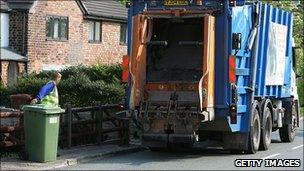Council Tax Benefit change 'to create poll tax Mk II'
- Published

Council tax benefit changes are set to come into force next April
The peer who designed what became known as the "poll tax" in the 1980s has warned that Council Tax Benefit cuts risk creating a "poll tax Mark 2".
Lord Jenkin says the cuts will mean that from next April large numbers of poorer households will be asked to pay council tax for the first time.
The government needed to be prepared for a backlash, he told the BBC.
Ministers say the Council Tax Benefit bill doubled under Labour and reform is needed to cut the UK's budget deficit.
About £500m - 10% of the total - is being cut from the fund for Council Tax Benefit for England, Wales and Scotland next year.
The benefit is paid to 5.9m people and on average is worth £15.69 a week, but in many cases is higher to meet the full cost of a Council Tax bill.
As well as the 10% cut in the total amount, it is also being scrapped as a national scheme, with each council in England in future deciding on who gets what council tax support.
Authorities will have the option of cutting benefit paid, or trying to fill the funding gap by scrapping the 50% discounts for second homes and empty properties - or cutting spending on services.
But they are not being allowed to reduce benefit for pensioners or to change the 25% discount for households with just one adult in them.
Some local authorities have already announced plans to not just scrap the council tax discount on second homes and empty properties, but to charge double the standard rate on those properties instead.
The Welsh and Scottish governments will have control over how they spend the money.
The change is included in the Local Government Finance Bill, which received its third reading in the House of Lords on Monday.
'Large number of fairly poor households'
Lord Jenkin told BBC Radio 4's The World at One he was not proud of having "dreamt up" in the 1980s the Community Charge - which became known as the "poll tax" and faced mass protest and a central London riot before being replaced by the Council Tax.
He said the same mistakes were being made now.
"The poll tax was introduced with the proposition that everyone should pay something, and with the present structure of society it doesn't work. We got it wrong," he told the BBC.
"The same factor will apply here, that there will be large numbers of fairly poor households who have hitherto been protected from Council Tax, who are going to be asked to pay small sums."
Lord Jenkin, who served in Margaret Thatcher's cabinet as Patrick Jenkin, wanted to change the new legislation to give local authorities the discretion to lower the 25% Council Tax discount for single person households - but his amendment was rejected.
"It is quite clear that without the amendment there will be substantial sums of Council Tax, very small figures individually, that councils will have to collect from a large number of pretty vulnerable households," he said.
Lord Jenkin said the government needed to prepare for a "backlash" when the cuts came into force.
He added: "I think the Treasury has taken a fairly brusque view of this all the way along and ministers in the DCLG have simply had to defend it."
The Department for Communities and Local Government says more people currently receive Council Tax Benefit in England than any other means-tested benefit or tax credit.
Another one million households, according to the Institute for Fiscal Studies, receive the benefit in Scotland and Wales.
A spokesman for the DCLG said: "Spending on Council Tax Benefit doubled under the last administration and welfare reform is vital to tackle the budget deficit we have inherited."
- Published27 August 2011
- Published2 August 2011